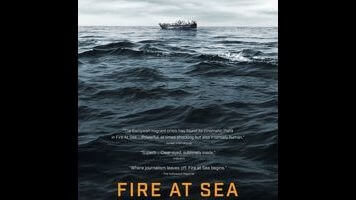That material constitutes only about half of the movie, however—maybe even less. Fire At Sea also spends a great deal of time observing Lampedusa’s inhabitants as they go about their daily business. We check in several times on a DJ who takes requests from listeners wanting to dedicate songs to loved ones. Local fishermen are observed plying their trade. Rosi focuses in particular on a 12-year-old boy named Samuele, who spends his free time hanging with friends, riding a motorbike, and shooting holes in cactus plants with a slingshot—a reminder of the goofy ways that little kids entertain themselves when they don’t have smartphones and video games. Rosi occasionally shows Samuele’s grandmother listening to news reports about migrant tragedies on the radio, but Samuele himself seems entirely unaware of those events, and the film draws no explicit connection between its lighthearted and ghastly moments. Here is an island. Things happen on and near that island. Some of those things are heartbreaking. Others are banal. The end.
Because Rosi eschews any contextualization (apart from some opening text explaining the basic situation), it’s hard to accuse him of being didactic. All the same, Fire At Sea’s deliberate disjunction clearly has… well, “an agenda” sounds too diabolical, so let’s say it has a rhetorical goal in mind. For a while, it’s hard to tell whether the film means to damn Lampedusa’s residents for their apparent indifference to (or just their obliviousness of) the suffering that takes place a few miles off their coast, or whether the constant back and forth between crisis and routine is intended as more of a gently philosophical “life goes on” sort of statement. Eventually, though, Rosi starts suggesting, very subtly, that the migrant situation has a corrosive influence on Samuele’s psyche. The boy tells his physician that he suffers from anxiety, for example, and is seen firing a pretend machine gun. (The latter is deemed so significant that the film ends on it.) Just because the kid seems unaware of what’s going on, Rosi seems to argue, doesn’t mean he’s unaffected.
It’s not a very persuasive argument, unfortunately. Essentially, the vacuum between the film’s two disparate threads does all the work: If we’re shown a little boy who says he’s anxious for no reason, and we’re also shown numerous unrelated images of people dying nearby, there’s really not much to do except assume a cause-and-effect relationship, however specious said assumption might be. That’s how the human mind works, and Rosi takes full advantage of our natural inclination to connect dots. (It’s also worth noting that boys in pretty much every part of the world fire pretend guns.) What’s frustrating is that both of Fire At Sea’s interlocked halves work beautifully on their own—one could re-edit the footage into a first-rate investigative doc about the migrant crisis and a first-rate observational doc about daily life on Lampedusa. All of the film’s constituent parts are superb (with the exception of the DJ segments, which do seem extraneous). It’s the pointedly unpointed way they’ve been assembled that gives pause.

 Keep scrolling for more great stories.
Keep scrolling for more great stories.
